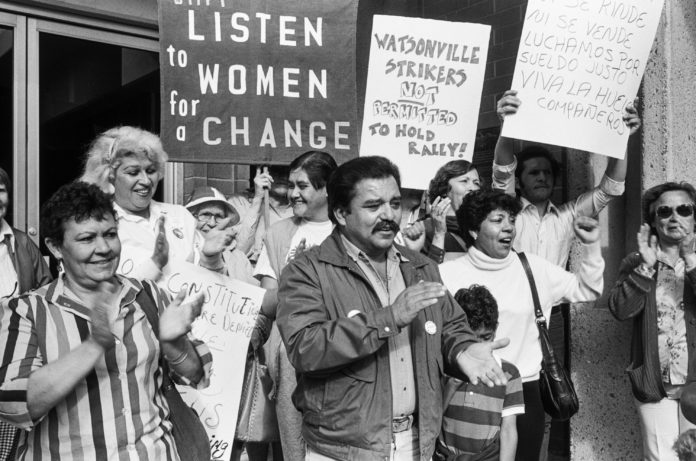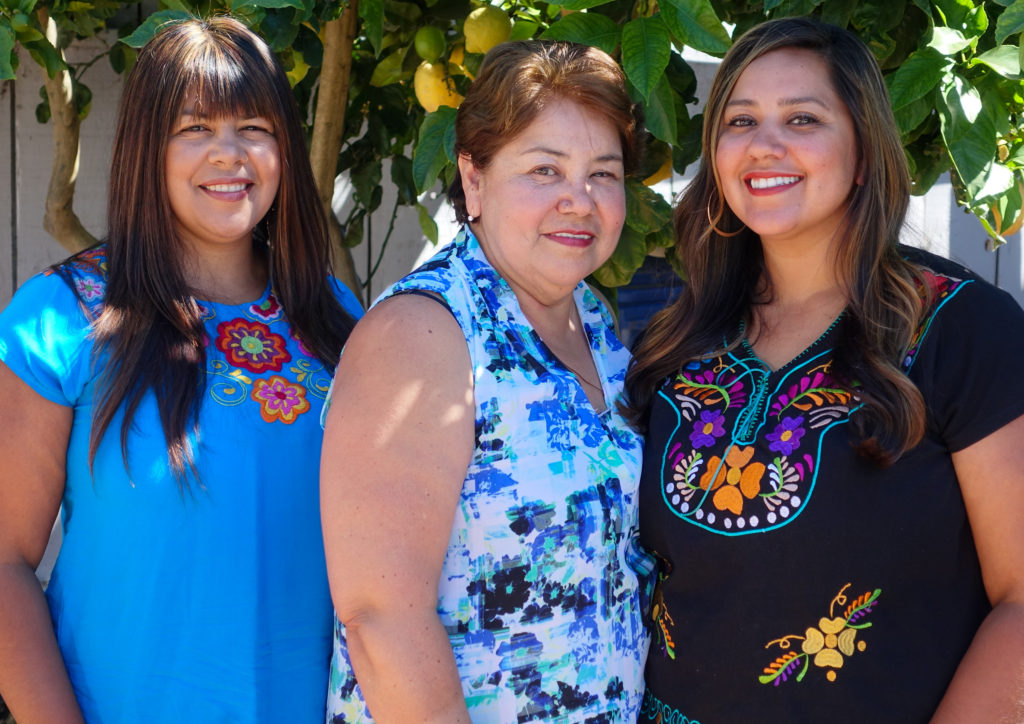
Four decades ago, Watsonville’s cannery industry was bustling, packing up the vast amount of agricultural products grown in the Pajaro Valley and preserving them for shipment around the world.
The lifeblood of this industry was provided by its thousands of workers—most of them women, and the vast majority Mexican immigrants.
In 1985, two Watsonville plants—Richard A. Shaw Inc. and Watsonville Canning and Frozen Food—proposed pay cuts and slashed family health benefits. In response, nearly 2,000 workers from both plants walked off the job and staged a months-long strike.
The action drew international attention and to this day is seen as a pivotal moment in the history of United States labor issues.
Often overlooked in this story are the children who watched their parents’ struggles. Inspired by what they saw, many of them have gone on to lead successful lives and become community leaders.
That’s the focus of Daughters of the Strike, a documentary by Jon Silver that focuses on the now-grown children of the strikers.

The film will be shown on March 8 along with the 1989 documentary Watsonville on Strike, also by Silver. The screenings are part of the Watsonville Film Festival, which runs March 6–25.
Ezperanza Torres, one of the strikers, said her daughters saw their house turned into a meeting place and refuge for strikers for its proximity to the plant. They also saw many getting arrested.
“I would explain what was happening to my children,” she said through a Spanish interpreter. “I told them that now you should be studying and preparing themselves so that you in your lives will not have to be in the situation that we found ourselves today. I think this really helped them in getting into college. It was an inspiration.”
Immigrants’ Tales
Many of the films focus on the experiences of immigrants, Watsonville Film Festival Director Consuelo Alba said, an issue that has become topical in the current political climate—especially in a community where many increasingly feel themselves in the crosshairs.
“This year it’s even more important and urgent that we create a space to tell our stories from our perspective, and to create common ground for all of us through empathy and understanding,” she said. “And storytelling. Film is a very powerful tool to bring people together and to talk about these challenges, joys and contributions of our community to the U.S.”
Attendees can see “They Call Me the Cross Man,” a short film about artist Alvaro Enciso, who places crosses in the Sonoran Desert where people have died crossing the border.
Reina Grande, who produced that film, will be in attendance for the premiere. She will also be at the Watsonville Public Library for a book signing and reception in celebration of her book Somewhere We Are Human, an anthology on the immigrant experience.
The film festival offerings span many genres, from documentaries to experimental to narrative, Alba says.
“It’s really inspiring to see the talent we have in our region,” she adds.
Making its California premiere is “The Long Valley” a short film about the people and sights of Salinas Valley’s agriculture region. That film is fresh off successful showings at the Sundance and SXSW festivals.
Featuring local residents Mas and Marcia Hashimoto, “The Vanishing Japantown” focuses on Watsonville’s historic Japantown and the closure of its last Japanese-owned business.
In addition to films of particular local appeal, a wide range of subjects and aesthetic styles are represented in the dozens of films screening at the festival. For example, filmmaker and former punk artist Mabel Valdiviezo captures the story of her reunion with her family in Peru after 16 years of estrangement.
Through her photo-paintings of the family, Valdiviezo’s full-length documentary Prodigal Daughter—screening in Santa Cruz on March 9—gives audiences a different angle on the experience of living in another country that challenges the prevailing narrative of “good immigrant” versus “bad immigrant.” As the director describes it, Prodigal Daughter “explores and humanizes the nexus of family reconnection, gendered migration, mental health, and art as a source of empowerment.”
Closer to home and much lighter in subject matter is the work of director Eugenia Renteria, a Watsonville-based director, cinematographer and editor. Born in Zacatecas, Mexico, she moved to California at age 12. Her film, “Fake It ’Til You Make It,” is a 13-minute love story.
Everyday Stories
Hector Aguila, whose short drama/comedy “916” will premiere on March 7, began as a volunteer with the festival and now serves as program manager.
Since its inception 12 years ago, the festival has expanded, with more than 50 films in the lineup as well as other happenings later in March.
The festival has also expanded in its geographical scope, with events in Santa Cruz and Salinas.
Aguila says he hopes to expand the number and types of people who attend the event.
“I would love for the people—your everyday families—to know about the festival,” he says. “I want people to know that truly we exist to bring value to the artists of our community, and to introduce our community to filmmakers in the Central Valley, California and beyond.”
Aguila also hopes to encourage more people to tell their stories through film.
“You don’t have to go to Hollywood, you don’t have to go to New York,” he says. “There are stories everywhere, and everybody has a story to tell. And most importantly we want people to value themselves and their stories, because if they value themselves and their stories, then they value their communities and they value their life. That’s part of the mission of who we are and what we do.”
Watsonville Film Festival
March 6
Opening Night—6-8pm, CineLux Green Valley Cinema, 1125 S. Green Valley Road, Watsonville. Screening of seven films, including “The Long Valley.”
March 7
Location: CineLux Green Valley Cinema, 1125 S. Green Valley Road, Watsonville, unless noted.
Emerging Cinema/Cine Emergente—5-7pm. Screening of seven films.
Creative Joy/Alegría Creativa—7:30–9:30pm. Screening of six films, including “Fake It Till You Make It’ And “Dear Watsonville.”
After Party—9:30–11:30pm, Buena Vista Brewing Company in Watsonville. Live music with Valley Roots.
March 8
Location: CineLux Green Valley Cinema, 1125 S. Green Valley Road, Watsonville, unless noted.
Youth Voices/Cine Joven—11am–12:30pm.
Si Pudiera Quedarme/If I Could Stay—1:30–3:15pm. Screening of 75-minute documentary on families staying together in the face of deportation.
Our World/Nuestro Mundo—4–6pm, Documentary shorts telling stories from Costa Rica, Cuba, China, Los Angeles and Watsonville.
Watsonville on Strike and Daughters of the Strike—6:30–8:30pm. Marking the 40th anniversary of the Watsonville cannery strike.
After Party—9-11pm, Buena Vista Brewing Company in Watsonville. Live music with Rasquache Liberation Front.
March 9
Location: 418 Project Movie Theater, 155 S. River St., Santa Cruz
Screening of Prodigal Daughter with the short film “Heaven in a Wild Flower”—1pm.
WWF in Santa Cruz/Un Cachet de WFF en Santa Cruz—4–6pm.Screening of several films from opening-night program.
March 14
WFF in Salinas/Un Cachito de WFF en Salinas—6–8pm at Maya Cinemas, 1153 Main St., Salinas. Screening of eight films.
After Party—9–1pm at XL Public House.
March 25
Leading Change/Lideres del Cambio—5–7pm at Cabrillo College Horticultural Center, 141 Calabria St., Aptos. Program featuring films by professional and emerging filmmakers will raise awareness about the use of pesticides in the community.
Watsonville Cannery Strike Photo Exhibition
Featuring photos from Pajaronian photographers Keith Ellison, Chip Scheuer, Diane Varni and Sam Vestal, the exhibit will be on view March 1–May 30 in the 2nd Floor Community Room at the Watsonville Public Library, 275 Main St. On March 15, Watsonville Cannery Strikers, their children and supporters will share stories with a reception to follow, starting at 1pm.For complete listings, visit watsonvillefilmfest.org.








